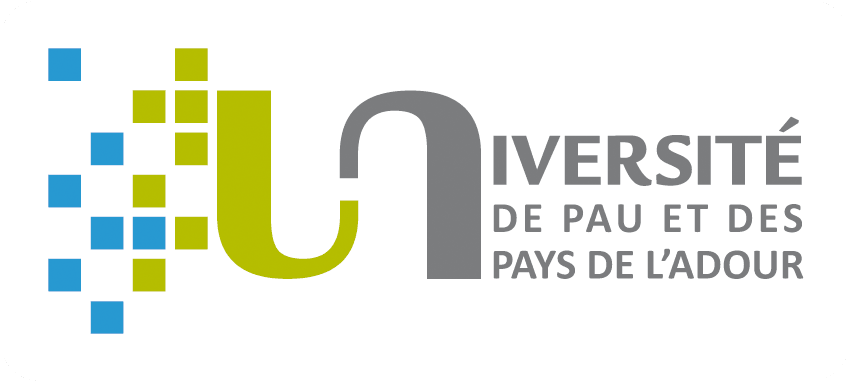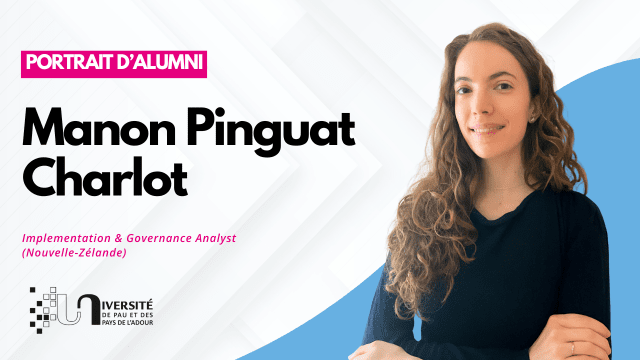Manon Pinguat Charlot, Implementation & Governance Analyst (New Zealand)
After a Bachelor's degree in Geography and Planning at UPPA, Manon Pinguat Charlot undertook an M1–M2 in Environmental Transitions, Society, Territory. She then embarked, also at UPPA, on a PhD in Geography. This training led her to the Department of Conservation of New Zealand where she works on the country's biodiversity strategy.
What are the main stages of your academic journey?
After earning a scientific baccalaureate (Bac S) in Martinique, I enrolled in a Bachelor's program in Information, Communication and Language Sciences at the University of Limoges. My objective was to take the speech-therapy competitive exam. I attempted it in the second year (L2) after a year of preparation, without success. The success rate being around 3%, I understood that candidates often have to take it several times with no certainty. As a result, I began to consider changing direction. Language sciences interested me but the courses were very theoretical, with a lot of grammar and few professional outlets. Geography presented itself quite naturally because it deals with very diverse issues — from accessibility in a city centre to biodiversity in high mountains — while remaining consistently practical. Regarding the choice of university, I chose Pau for its human scale. I received a credit transfer to start directly in L2 and I really enjoyed all the subjects taught. To such an extent that I decided to continue in this field. Accustomed since childhood to moving almost every year, I could have changed university, gone to Bordeaux or Toulouse… But most of the master's programs offered were highly specialized, and I was not yet fixed on my professional future; I looked for a master's broad enough not to close any doors. The only one that truly matched my aspirations was UPPA's M1–M2 Environmental Transitions, Society, Territory. Small cohort, projects focused on the territory, teachers I already knew, the possibility to continue working with GIS, statistics but also social and political sciences, links with territorial planning and urban planning… Everything was there, and I never regretted my choice to stay at UPPA.
When did you decide to pursue a PhD?
The master's internships were quite decisive. Having lived outside mainland France and coming from a multicultural family, I wanted to do my first internship abroad, in Brazil, where I was able to study and write a report on conflicts around foraging by indigenous populations ("Beyond conflicts of use: understanding tensions related to the extractivism of Mangabas in the state of Sergipe, Brazil"). I spent time with women in traditional communities, researchers and government officials. It was fascinating! As a result, I did a second research-oriented internship within a UPPA laboratory and wrote a dissertation on environmental certifications in rural territories. That subject already prefigured my doctoral topic, under the supervision of Frédéric Tesson, within the LEDYTER program (Environmental labelling and revitalisation of rural territories). In September 2018, I received a positive response from the Nouvelle-Aquitaine region for a three-year doctoral contract, including 96 hours of teaching at UPPA. My doctoral research ultimately focused on "The governance of the air-energy transition through territorial management and labelling systems: control, management and reflexivity of the Cit'ergie label." Unfortunately, COVID-19 intervened, which had consequences. I had to give up the E2S scholarship that had been awarded to me to spend five months at the Hamburg centre of excellence on climate change. The interviews I had planned with local authorities, consultants and elected officials were either cancelled or converted into telephone exchanges. At that time, fortunately, the faculty and research engineers at UPPA were very supportive in assisting doctoral students and helping them refocus their work. Ultimately, I defended my thesis "under COVID constraints" before an audience limited to ten people. At the same time, as a teacher myself, I had to support my students, some of whom were in distress. I learned a great deal on a human level; solidarity was a strong value during that period.
What career path did you envisage after completing this thesis?
At one point, I considered doing a post-doc and then applying for a lecturer-researcher position at a university. However, there are few positions and many candidates, so I preferred to move towards research consulting. In parallel, my partner and I planned to go and work in New Zealand. Once there, after four months of job searching, I was hired by a firm specialized in research and statistical analysis that worked on behaviour change and the adoption of sustainable practices in industry and agriculture. I stayed eight months in this "mini lab" where I was able to apply everything I had learned at UPPA. My only frustration was producing large reports that often remained on shelves; I did not really see the impact of my recommendations. I therefore resigned to find a job more oriented towards field action. That was during an election period in New Zealand, and positions were frozen. I worked for a few months at the Alliance Française and then found my dream job within the Department of Conservation of the government, where I work on New Zealand's biodiversity strategy. In this role, I was responsible for consulting Māori tribes and the public on the country's next biodiversity action plan, as well as for liaising with other ministries and regional councils. I also provide advisory support to the ministers' office on decisions to reconcile constraints and biodiversity protection. Once again, I find that UPPA perfectly prepared me for the expectations of public service.
Two or three words you would immediately associate with UPPA?
Rooted in the territory, the quality of the programs, the authenticity of relationships between students, faculty and administrative staff at UPPA.
One piece of advice for students beginning their studies?
I would tell them to be strategic so as to keep as many doors open as possible, to take the time to choose what one truly likes and to understand how to turn an interest in certain subjects into a professional pathway. That is how one learns to know oneself. Be proactive and curious to remain actors of your path. There is no inevitability!
Interview by Florence Elman
Want to know more?
L3 Geography M1–M2 Environmental Transitions, Society, Territory

Comments0
Please log in to see or add a comment
Suggested Articles


